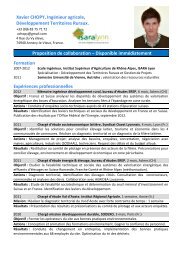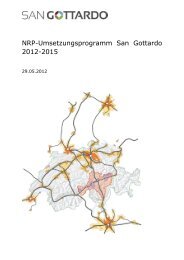Actes du colloque Marché de la recherche regiosuisse & Colloque ...
Actes du colloque Marché de la recherche regiosuisse & Colloque ...
Actes du colloque Marché de la recherche regiosuisse & Colloque ...
Erfolgreiche ePaper selbst erstellen
Machen Sie aus Ihren PDF Publikationen ein blätterbares Flipbook mit unserer einzigartigen Google optimierten e-Paper Software.
30 Alberto Bramantihelped to focus on their business and have become more competitive even on theirdomestic market.5 New research trendsIn the present agenda different challenges stand out and, among the many, one ofthe most important is certainly the following:– how to serve a ‘local’ system of pro<strong>du</strong>ction (most of the times composed bySMEs) interfacing a ‘global’ system of services suppliers.Just to mention we can think about a number of services – finance/insurance;transport/logistic; public utilities, <strong>la</strong>rge distribution (both retail and wholesale), businessservices (legal, technological, information and computing services), media/culture/entertainments– strongly affecting the pro<strong>du</strong>ctivity of in<strong>du</strong>strial firms.Many of these services are KIBS (knowledge intensive business services) and theirrole is of the greatest importance in fostering territorial competitiveness: KIBS employa highly skilled <strong>la</strong>bour force, create and diffuse knowledge; they are innovative andhelp other firms to be innovative. SMEs can survive and grow in a turbulent globaleconomic environment if they are flexible, customer focused and pro-active to theirbusiness milieu, and KIBS may help them in doing so.Lombardy region has the chance to share a dynamic SMEs in<strong>du</strong>strial tissue and aKIBS sector well <strong>de</strong>veloped and therefore it has the moral obligation to keep the twotogether, to make KIBS reachable and usable also by SMEs, to assure an interfacebetween SMEs and services provi<strong>de</strong>rs.Market transparency is in fact of the greatest importance as this is a privileged fieldfor information asymmetries. Supervising and controlling the prices formation mechanism,ensuring (an certifying) services quality, matching <strong>de</strong>mand and supply, enhancingthe a<strong>de</strong>quacy of SMEs in getting in contact with KIBS provi<strong>de</strong>rs, all of themwill be very appreciated actions.6 Lessons to be learned and main conclusionsWhen actors knowledge is limited and the environment is uncertain, institutions andorganisations help to re<strong>du</strong>ce such limitations. The role of regional government, and ofother actors contributing to the governance of the system, is important in or<strong>de</strong>r to assurethe territorial flexibility nee<strong>de</strong>d to meet the competitive challenge.Innovation needs to be consi<strong>de</strong>red in all its manifestation, only a few of which may bedirectly linked to the level of national R&D, and public support for innovation, in itsturn, needs to be responsive to the changing and increasingly open and internationalnature of innovation in all its forms.Innovation should be therefore addressed by regional policies not just in terms ofbringing new technology to market, but also (and perhaps better) in terms of modifyingbusiness mo<strong>de</strong>ls and enhancing organisational structures, pro<strong>du</strong>ction processes,as well as using services (KIBS inclu<strong>de</strong>d) and supports.Within this logical frame innovation support can be tailored to particu<strong>la</strong>r regionalneeds. A convincing aspect of this <strong>de</strong>clination is linked to the concept of ‘enterprisehub’, i.e. a regionally fun<strong>de</strong>d col<strong>la</strong>boration around innovation and enterprise. It brings
















